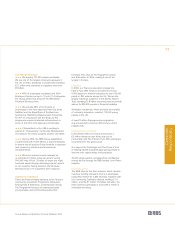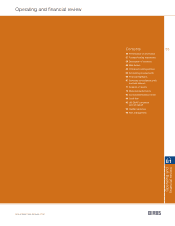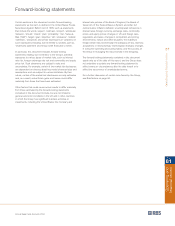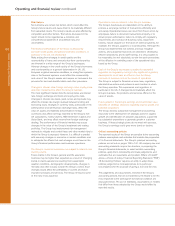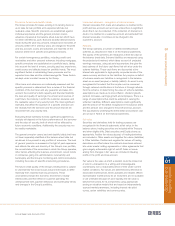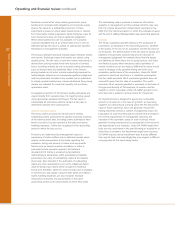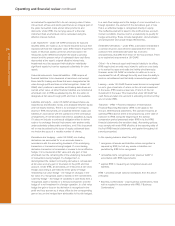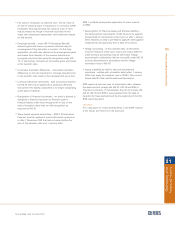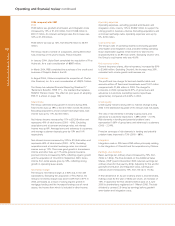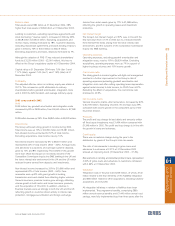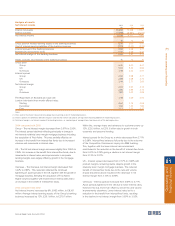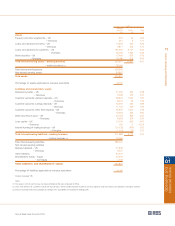RBS 2004 Annual Report Download - page 65
Download and view the complete annual report
Please find page 65 of the 2004 RBS annual report below. You can navigate through the pages in the report by either clicking on the pages listed below, or by using the keyword search tool below to find specific information within the annual report.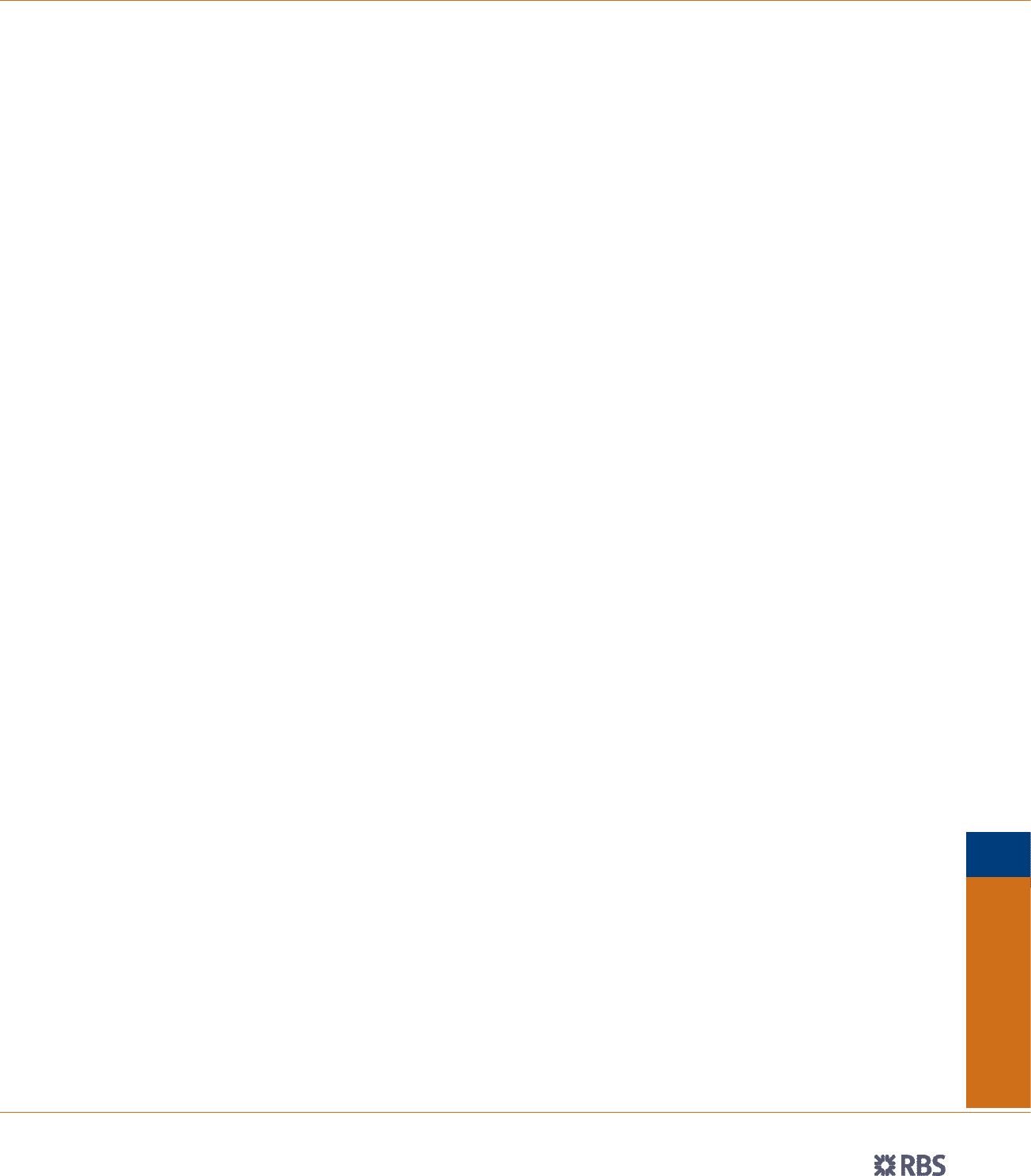
section
01
Operating and
financial review
63
Annual Report and Accounts 2004
Operating and financial review
Accounting developments
UK GAAP
UITF Abstract 38 ‘Accounting for ESOP trusts’ and the
consequential amendment to UITF Abstract 17 ‘Employee
share schemes’ which are applicable for the year ended 31
December 2004 did not have a material effect on the Group.
The Accounting Standards Board issued FRS 27 ‘Life
Assurance’ which introduces a new ‘realistic’ method of
measuring life assurance liabilities and related assets. The
present value of in-force polices can continue to be
recognised provided that future investment margins are not
included. The standard is applicable under UK GAAP for years
ending on or after 31 December 2005 and is not expected to
have a material effect on the Group.
International Financial Reporting Standards
In June 2002, the European Union adopted a regulation that
requires, from 1 January 2005, listed companies to prepare
their financial statements in accordance with international
accounting standards adopted by the EU. The Group’s 2005
financial statements will therefore be prepared in accordance
with International Financial Reporting Standards (“IFRS”).
These comprise not only IFRS but also International
Accounting Standards (“IAS”).
IFRS differ in certain significant respects from the Group’s
accounting policies under UK GAAP. The summary below
outlines the important differences for the Group in respect of
recognition and measurement on the basis of extant IFRS that
will be effective for 2005, including revised IAS 32 and IAS 39:
Goodwill – IFRS require goodwill arising on the acquisition of
subsidiaries or associates to be capitalised. Amortisation of
goodwill is prohibited but it must be tested annually for
impairment (and whenever changes in circumstances indicate
impairment). Under the Group's UK GAAP accounting policy,
goodwill arising on acquisitions after 1998 is recognised as an
asset and amortised on a straight-line basis over its useful
economic life. Impairment tests are carried out at the end of
the first full accounting period after its acquisition, and
whenever there are indications of impairment. Goodwill arising
on acquisitions before 1 October 1998 was deducted from
reserves immediately. Certain amounts that would be included
as goodwill under UK GAAP are recognised as intangibles
under IFRS. Such intangibles are amortised over their useful
lives unless they are regarded as having an indefinite useful
life in which case they are not amortised but tested for
impairment annually (and whenever changes in circumstances
indicate impairment).
Merger accounting – IFRS require all business combinations
to be accounted for as acquisitions by applying the purchase
method. UK GAAP requires business combinations meeting
certain criteria to be accounted for using merger accounting.
Dividends – IFRS require dividends payable to be recorded in
the period in which they are declared whereas under UK GAAP
dividends are recorded in the period to which they relate.
Computer software – under UK GAAP, most software
development costs are written off as incurred. Under IFRS,
such costs are capitalised if certain conditions are met and
amortised over the estimated useful life of the software.
Pensions – the Group has implemented FRS 17 'Retirement
Benefits' (FRS 17) for 2004. The measurement principles of this
standard are similar to those required by IFRS. IFRS, like FRS
17, allow actuarial gains and losses to be recognised outside
the profit and loss account. However IFRS allow as alternatives
actuarial gains and losses to be recognised in profit or loss
either in the period in which they occur or on a deferred basis.
Share-based payments – under UK GAAP, no compensation
expense is recognised for Inland Revenue approved Save-as-
you-earn share option schemes or for other share option
schemes where the option has no intrinsic value (i.e. where at
date of grant the exercise price equals the market value). IFRS
require the fair value of share options at the date of grant to
be recognised as an expense
Financial instruments: financial assets – under UK GAAP, loans
are measured at cost less provisions for bad and doubtful
debts, derivatives held for trading are carried at fair value and
hedging derivatives are accounted for in accordance with the
treatment of the item being hedged (see ‘Derivatives and
hedging’ below), and securities are classified as being held as
investment securities, or held for dealing purposes. Investment
debt securities are stated at cost less provision for any
permanent diminution in value. Premiums and discounts on
dated securities are amortised to interest income over the
period to maturity. Other securities are carried at fair value.
Under IFRS, financial assets are classified into held-to-maturity;
available-for-sale; held for trading; designated as fair value
through profit or loss; and loans and receivables. Financial
assets classified as held-to-maturity or as loans and
receivables are carried at amortised cost. Other financial
assets are measured at fair value. Changes in the fair value of
available-for-sale financial assets are reported in a separate
component of shareholders’ equity. Changes in the fair value of
financial assets held for trading or designated as fair value are
taken to the profit and loss account. Financial assets can be
classified as held-to-maturity only if they have a fixed maturity
and the reporting entity has the positive intention and ability to
hold to maturity. Trading financial assets are held for the
purpose of selling in the near term. IFRS allow any financial
asset to be designated as fair value through profit and loss on
initial recognition. Unquoted debt financial assets that are not
classified as held-to-maturity, held for trading or designated as
fair value through profit or loss are categorised as loans and
receivables. All other financial assets are classified as
available-for-sale.
Effective interest rate and lending fees – under UK GAAP, loan
origination fees are recognised when receivable unless they
are charged in lieu of interest. IFRS require origination fees to
be deferred and recognised as an adjustment to the effective
interest rate on the related financial asset. The effective interest
rate is the rate that discounts estimated future cash flows over


